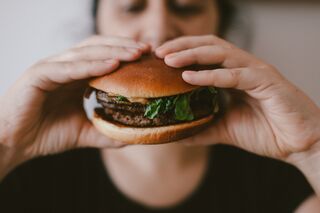Guilt
How Meat-Eaters Offset Guilt About Consuming Animals
Getting angry at others may help us feel better about our own dietary habits.
Posted October 25, 2021 Reviewed by Ekua Hagan
Key points
- Eating meat can make people feel guilty.
- To offload their guilt about eating meat, people express moral outrage towards other parties they deem more responsible than themselves.
- Self-affirmations can blunt feelings of guilt, but this can undermine one of guilt's key functions: to motivate us to make proactive changes.

About 5% percent of American adults identify as vegetarians (meaning they don’t eat meat or fish) while about 3% identify as vegans (meaning they eschew all animal products, including eggs and dairy). That leaves over 90% of our country identifying as fish and/or meat-eaters. And as carnivores, pescatarians, and plant-based eaters alike can attest, criticism towards meat consumption—from its environmental cost to its potential personal health tolls—has been mounting over the past decade. So how do meat eaters (this writer included) justify their ongoing consumption of animal products? A new paper published in a forthcoming edition of Social Psychological and Personality Science led by Bellarmine University’s Hank Rothgerber explored a subtle behavioral trick animal-eaters deploy to feel less guilty about their eating habits.
The Context
Rothgerber and his team already knew that some meat-eaters reduce guilt by denying the animal mind (e.g., minimizing animals' ability to experience pain), identifying as hedonists, attributing their meat consumption to necessity or social norms, or espousing a belief that humans dominate the natural world and are therefore entitled to eat the lowly animals beneath them. Other meat eaters may actively avoid information about food production; refuse to link the animal on their plate with living, breathing animals; opt to consume only animals who are treated humanely; or disassociate themselves from other meat-eaters by reducing their meat consumption and claiming the moral conundrum of meat-eating doesn’t apply to them. In the present paper, Rothgerber et al. set out to explore how expressing moral outrage towards third parties helps meat-eaters reduce their guilt over eating meat.
The Research
In the first of three studies, 310 individuals read an article describing the inhumane conditions in which animals are often raised and slaughtered. Half of the participants were then provided an opportunity to express how incensed they were via a scale measuring moral outrage towards factory farm owners and operators. All participants then rated how guilty, regretful, and apologetic they felt about factory farming before rating how creative, funny, leadership-prone, fit, and sociable they considered themselves.
Results indicated that participants’ guilt decreased and favorable self-image increased when they were able to express moral outrage, which presumably "served to restore such individuals’ desires to feel moral and to reduce tension from the animal welfare concerns associated with eating meat,” Rothgerber et al. write.
The second study randomly assigned 800 adults either to a meat threat condition, in which they read an article depicting factory farming’s abuses, or a no meat threat condition, with no reading required. Half were given random chances to express moral outrage at factory farm owners and operators via the same outrage rating scale used in the first study. Subsequently, all participants rated their personal levels of guilt (also in the same manner as folks in the first study did). Once again, participants given a chance to express moral outrage felt less guilty and judged themselves as more moral than those deprived of the opportunity to express outrage.

Rothgerber et al.'s third study randomly assigned 300 participants to similar meat threat (article reading) or no threat (no article reading) conditions. All were then instructed to read an article about animal abuses at SeaWorld. Some participants were then prompted to describe traits of theirs that increased how decent they considered themselves. Others were prompted to note their preferences for electronics. Finally, all participants reported their degree of moral outrage.
Here, reading an article about factory farming abuses increased how morally outraged participants felt at alleged SeaWorld abuses. But those prompted to consider what made them good and decent characters expressed significantly less moral outrage than those unprompted to reflect on what made them decent.
“Taken together, the current findings suggest that expressing moral outrage at third-party transgressors reduces the cognitive dissonance people feel from eating meat. When feeling accountable for the abuses of factory farming, expressing moral outrage at factory farm directors enabled meat-eaters to reduce guilt and to enhance self-rated moral character,” Rothgerber and his colleagues write. “That self-affirmation negated the need for moral outrage suggests that motivations behind outrage reflect aims to repair moral self-image.”
What This Means for Us
Whether you’re a meat-eater or not, next time you’re inclined to express moral outrage, consider your motivations for doing so: Is it to make actual changes in a system you see as flawed? Or is it to increase how good you feel about yourself by offsetting guilt—or blaming another party for something you feel responsible for? We can all benefit from greater self-awareness, especially when it comes to why we feel guilty.
Guilt motivates us to right what we see as wrong—making amends to a person we’ve hurt or upset, say, or advocating for changes in how we and other people treat fellow humans, animals, or the environment. If and when we feel guilty about eating meat we may benefit from sitting with that guilt for a little bit longer, without jumping to accuse others simply to rid ourselves of discomfort and allow it to transform our behavior in a manner that actually reduces the suffering of animals as well as the impact of factory farming practices on the environment. Eating less meat and more plants is one place to start. Investing in cruelty-free products when we can is another. We don’t need to go completely vegan or vegetarian but reducing our consumption of animal products can make a significant difference in our health, the health and well-being of animals, and the wellness of our entire planet.




